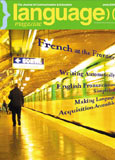Enshrining English

So, Virginia Representative Virgil Goode and the ten co-sponsors of his proposed amendment to the U.S. Constitution (see News, p.10) think that linguistic diversity is such a threat to this country that we need to take extreme measures to protect ourselves from it.
Of course, this is not the first attempt to make English the nation’s official language and many States have declared it their official language. In fact, Goode’s proposed amendment is not the only official-English legislation in Congress at the moment. There are two other bills with the same aim, but at least they do not require changing the very Constitution of the United States.
Americans have traditionally resisted legislative impositions on their language since 1780, when John Adams proposed the establishment of an official Language Academy to set standards for English. This idea was rejected by the Continental Congress as an improper role for government and a threat to individual liberties. A century later, President Roosevelt’s attempt to “reform” English spelling also failed. There was no English proficiency requirement to become naturalized as a U.S. citizen until 1906 – the first major language restriction to be enacted at the federal level.
The Continental Congress printed its official documents in German and French without any objections and States often catered to minority-language requirements. Before World War I, bilingual education was common in areas where minority-language groups had political influence. During the 19th century, state laws, constitutions, and legislative proceedings appeared in a host of languages like Norwegian, Czech, Welsh, Spanish, French, and German.
People the world over recognize that English is our global language. China, which is regarded by many Americans as our major competitor, recognizes the importance of English. Instead of being afraid of its dominance, more than 250 million Chinese people are learning English so that they can operate on the global stage.
Amending the Constitution is a momentous undertaking that should only be reserved for truly fundamental matters of state, like the abolition of slavery and the introduction of universal suffrage, not something as inconsequential as the adoption of English as an official language. So, we must look deeper into the motives behind this proposal. Fortunately, Rep. Goode reveals his motives on his website, where he quotes the example of bilingual Canada being threatened by efforts to “split French speaking Quebec off from the rest of the English speaking Canada” which seems to contradict our report in this issue (p. 28) on the diverse locations for French immersion in Canada. Goode is even more revealing as he continues by suggesting that “there are some from Mexico who are already saying that the Mexican War was wrong and that the United States should be split in the Southwest.”
Despite having lived in the Southwest for several years, working and socializing with Mexican-Americans and other immigrant communities, this is the first that I have heard of a movement to devolve. According to the 2000 Census, 92 percent of America’s population age five and older speaks English “very well.” Among Spanish-speakers, the largest group of immigrants who speak another language, 70 percent know English either “well” or “very well.” The figure is almost exactly the same for speakers of Asian languages, the second-largest group.
It is the age-old fear of strangers upsetting the status quo that is the real inspiration behind this proposal, which does not warrant the time and consideration of our elected
representatives.
The U.S. is strengthened by its diversity of ethnicity, culture and language, not weakened.
IN THIS ISSUE:
John Kerry: Too French for U.S. President
Domenico Maceri suggests that Kerry’s language ability
may be an obstacle to his election effort
Pronounced Perfect
In the first part of our new guide to English pronunciation, Steven Donahue provides standardized tests
Making Foreign Languages All-Inclusive
Lori Langer de Ramirez, Dianne Laruccia and Tania DeSimone explain how special needs children can be incorporated in the foreign language classroom through a model program
Breaking the Writing Wall
Steven Donahue explains how Miami Dade College is using a new breed of writing lab that automatically evaluates essays, detects plagiarism, and helps educators improve students’ compositions
A Plains Case for Foreign Languages
Dr. Joseph Graves argues that the benefits of introducing a foreign language requirement in the elementary grades far outweigh the burdens even in rural South Dakota
Study Abroad: French in Canada
Boris Bélier proposes some French immersion destinations that bring adventure to learning
The Fading Star of Spanglish
Myra Medina argues that the mixing of Spanish and English does neither language any good


